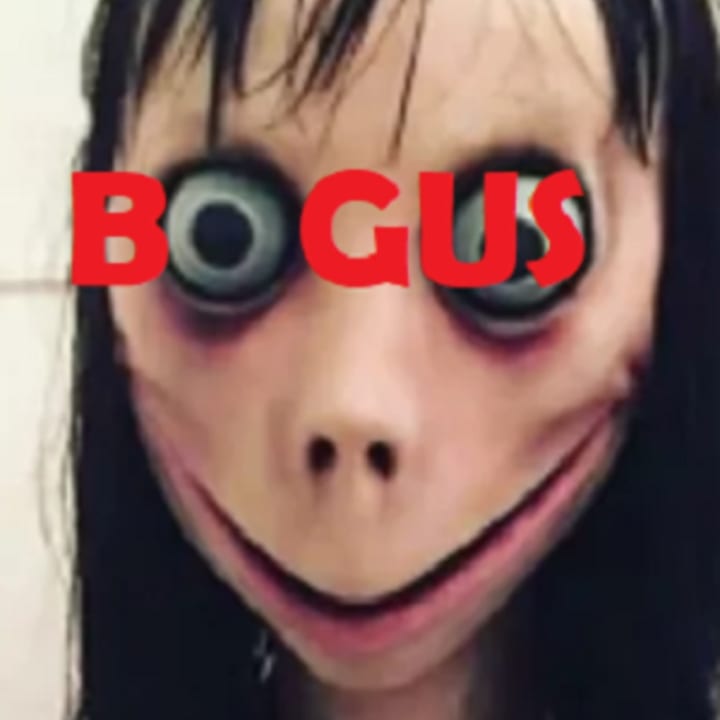Yes, teen suicide continues to plague the U.S. But in a country of nearly 326 million, there hasn’t been a single reported incident of a child responding to "The Momo Challenge” by taking pills, stabbing someone or harming themselves, authorities said this week.
“Please be aware that many trusted sources say IT IS A HOAX,” said Acting Bergen County Prosecutor Dennis Calo, one of the top law enforcement officers in the state.
“With social media, things can spread quickly. Sometimes, info is right and other times wrong,” the prosecutor said.
In this case, he said, YouTube itself “reports no evidence of the video recently targeting kids, as it has been reported on social media, especially young children on YouTube Kids.”
The YouTube Kids app automatically filters out inappropriate content for children, so it couldn’t happen there, he said.
The freakish face with the dark hair and bulging eyes is a piece of artwork called “Mother Bird,” created by Keisuke Aisawa for the Japanese special horror effects company Link Factory.
It wasn't intended for the “Momo Challenge,” which urges participants in the Facebook-owned messaging app WhatsApp to complete various tasks or be “cursed.” Some involved self-harm, including suicide.
“Slice your leg and you’ll never meet me,” the voice on the video says. “Slice your wrists and your parents will never see me.”
There are other Momo videos on YouTube (originating in Japan, Mexico and Colombia) that also have parents terrified that their children will get ideas.
Which, of course, means viral warnings that continue to multiply, spreading exactly the kind of panic that the creator intended.
We’ve been here before.
Who remembers the claims that playing Beatles records backward – and, in the process, damaging turntables – revealed Satanic messages?
Or that heavy metal songs urged kids to kill themselves?
A year ago, reports spread that the “Momo Challenge” convinced a 12-year-old girl in Argentina to hang herself. Authorities there, however, said they believed another teen she met online was responsible.
Momo connections were drawn in reports of other suicides that at first seemed direct but later proved tangential or entirely unfounded.
Eventually, the concern faded.
Now it’s back.
Some police departments across the country have been duped into sharing the latest warnings on social media. Local educators even got involved this week.
“We got a letter from the school [Friday] because ‘all the kids’ were talking about it and they don’t want them all talking about it at school,” one Bergen County mom wrote. “They were all talking about it because all their parents just talked to them
"It was a definite ‘Catch-22’ situation.”
“It’s a classic hoax in an age of fake news, when people don’t know what is and isn’t real,” another mother said. “And the reason it spread so quickly is because of the guilt that many moms feel about how much private screen time [that their kids have].
“It only reinforces the idea that bad moms let kids watch videos.”
Definitive sources that have debunked Momo include Snopes.com, a site renowned for investigating social media rumors and sorting the (rarely) genuine from the (mostly) bogus.
“Many purported ‘challenges’ of this variety have proved to be much more the products of fevered imaginations and lurid news reporting rather than real-life phenomena,” Snopes founder David Mikkelson said earlier this week.
Suicide rarely has a singular cause, cyberpsychology expert Dr. Dawn Branley Bell told Yahoo News.
“Those that are vulnerable to this type of content are likely to have other reasons behind this vulnerability,” she said.
“I feel that our time and effort would be better spent concentrating on addressing the reasons behind the initial psychological vulnerability — whether that is low self-esteem, mental health issues, or environmental issues — rather than the online content,” Bell added.
“All of a sudden if I bring it up, I’m going to put the idea in their head,” Devon Corpus, a clinical social worker, told KION News. “That’s not how it works.”
The irony, some experts say, is that the fear-mongering being spread by adults so quickly on traditional and social media – wanting desperately to keep their kids safe – is what's breathed life into the creepy-looking figure.
If taken for what it’s truly worth, Momo “would have faded into obscurity on its own” instead of “gaining traction,” RelevantMagazine.com reports.
“All of these challenges and trends follow the same formula,” Taylor Lorenz wrote in the Atlantic. “A local news station runs a piece overstating a dangerous teen trend. Concerned parents flock to social media to spread the word. Actual teenagers and anyone else who lives their life Extremely Online mock them for their naïveté.
"Brands and influencers hop on the trend, parodying it and exploiting it for their own gain. And trolls take advantage of those who believe it’s real, often by creating and posting content that seemingly confirms parents’ worst fears.”
It’s no different than those warnings about kids eating Tide Pods, using “bath salts” or playing “the knockout game”: One, two or even three isolated incidents suddenly are branded a trend.
If you’re truly worried, experts say, talk with your children respectfully. Let them know them that you trust them to let you know what’s happening out there. Then concentrate on genuine issues such as cyberbullying, inappropriate sexual content and extreme violence.
“Vigilance requires wisdom and being able to sort real threats from paranoia,” RelaventMagazine.com wrote.
“It makes sense that parents want to keep their children safe,” The Atlantic reports says. “But ‘Momo’ isn’t what they need protection from.”
Click here to follow Daily Voice North Passaic and receive free news updates.


